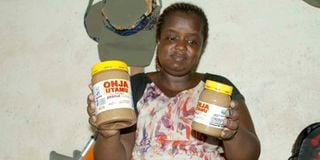Premium
Reaping big from peanut butter

Mary Wangoi, a Member of Tunaweza Women With Disabilities CBO, displays the products at the group’s premises in VOK area of Mombasa in this photo taken on March 25, 2022.
What you need to know:
- Prices for their products ranges from Sh70 to Sh800 depending on the quantity that one wants.
- In a month, the association can make up to Sh70, 000 from sales, depending on demand.
When a group of women living with disability in Mombasa’s VoK area came together for support due economic difficulties, they had no idea that their unity would give rise to a peanut butter value addition project.
The project is an initiative of more than 15 members, and the goal is to ensure that the association’s members become self-reliant.
Tucked inside a residential building along the dusty VoK to Mlaleo road is the Tunaweza PWD Community Based Organisation.
On an ordinary day, the project director Charity Chahasi will be found moving up and down overseeing the peanut butter processing.
“We started this community peanut butter plant as a way of ensuring that women and children living with disabilities get economic support and are not affected by their physical conditions which they can do little about,” said Chahasi.
The project began in 2016 through selling the processed peanut butter locally and issuing out sales commission to members who conducted the sales.
They started off with their first machine that processed two kilograms before purchasing a new one that could process up to 50 kilograms of the commodity in a day.
The process of making peanut butter in a mini value addition plant like that of the Tunaweza CBO is meticulous and surprisingly starts at the farm.
Cleaned peanuts
The peanuts sourced from Busia are harvested during clear weather and when the soil is dry enough. The nuts are removed from vines by pickers and transported to peanut shellers for drying, then delivered to storerooms for cleaning.
Blowers remove dust, sand, vines, stems, leaves, and empty the shells. The raw, cleaned peanuts are then stored unshelled in silos or storerooms.
In their small plant, the association roasts and cool the peanuts.
“After that process, they undergo removal of the skins using heat or water,” explained Chahasi.
She says that they also add salt at this stage to improve smoothness, spreadability and flavour.
The year 2018 was a successful one for their business as the demand grew after they bagged several supply deals with local supermarkets.
“This provided us with an opportunity to make more of the product to improve our income. We increased production to meet the demands,” she explained.
But just like any other business, the association has encountered problems, with some supermarkets failing to pay despite being supplied with the products.
Cost of labour
She explained that one supermarket which was their client collapsed with more than Sh50, 000 in unpaid deliveries.
Ms Chahasi says that despite the success they have made in processing peanut butter, the association needs a good and efficient machine to enhance production.
She said that the machine that the association is currently using is small and manual, making it a bit harder to increase production.
“We need a modern shelling and grading machine that can grind up to Sh100 kilograms in a day. This will not only help in reducing the cost of labour but also production time,” she said.
She also said that the association needs a sorting and packing machine as they are currently doing it manually. They are also renting the premises where they do the production
She, however, maintains that their product has better quality just like any other brand in the market.
“We are competing with more established brands known globally. Our peanut butter does not have any preservatives,” she said.
Prices for their products ranges from Sh70 to Sh800 depending on the quantity that one wants.
Group’s goal
Packaging is done in different sizes inside containers ranging from 60 to 1,000grams.
Peanut butter packed in a 60 grams container goes for Sh70 while the one in 1,000 grams costs Sh800. Others are packed in 120, 200 and 500 grams containers.
The association’s sales person, Mary Wangui, says that the group’s goal is to supply its products to the international market. She says that with the right machines, this goal is achievable.
“Ministry of Agriculture officials has taught us a lot on value addition,” she says.
The association works closely with the Kenya Bureau of Standards which has approved their products for consumption.
In a month, Ms Wangui said the association can make up to Sh70, 000 from the sales, depending on demand.
Their expenses per month come to around Sh10, 000, which are in form of water, electricity and labour costs.
The already made peanut butter is stored in a refrigerator with temperatures ranging from two to six degrees celsius awaiting distributions to the customers.





